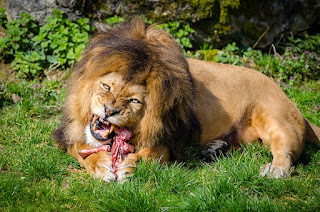The lion’s share is the largest share or portion of something.
Examples
“The county council takes the lion’s share of the total council tax bill at around 80 per cent.”
“No candidate declared outright victory in Iowa, although a few strongly implied, with unofficial tallies, that they had won the lion’s share of delegates.”
“When you invest in a career working for someone else, the lion’s share of the value you create goes to your employer.”
While the above examples are taken from news items, my inspiration for this post came from Tan Twan Eng’s novel, The Garden of Evening Mists [1]:
“The Asian Co-Prosperity Sphere was now in place – with Japan enjoying the lion’s share of the prosperity.”
Set in Malaysia, this was recently made into a film. I learned much history from this book, and I was awed by the author’s striking use of language.
What is the origin of this phrase? My first thought – that no one would want to argue with a lion – was confirmed by an entry in Brewer’s Dictionary of Phrase and Fable, which states that it originates from Aesop’s Fables [2]. In the version I have, the title of the story is “The Lion’s Share.”
“The Lion went once a-hunting along with the Fox, the Jackal, and the Wolf. They hunted and they hunted till at last they surprised a Stag, and soon took its life. Then came the question how the spoil should be divided. ‘Quarter me this Stag,’ roared the Lion; so the other animals skinned it and cut it into four parts. Then the Lion took his stand in front of the carcass and pronounced judgment: ‘The first quarter is for me in my capacity as King of Beasts; the second is mine as arbiter; another share comes to me for my part in the chase; and as for the fourth quarter, well, as for that, I should like to see which of you will dare to lay a paw upon it.’ ‘Humph,’ grumbled the Fox as he walked away with his tail between his legs; but he spoke in a low growl .‘You may share the labours of the great, but you will not share the spoil.’” [3]
Photo credit: Mathias Appel (Creative Commons)
[1] Eng, Tan Twan. The Garden of Evening Mists (p. 262). Canongate Books. Kindle Edition.
[2] “Lion” In Brewer’s Dictionary of Phrase and Fable, edited by Susie Dent. 19th ed. Chambers Harrap, 2012.
[3] Aesop. Aesop’s Fables (Kindle Locations 37–43). Kindle Edition.
I blog about editing, proofreading, and the English language.
Comments and suggestions are welcome.
Many of the phrasal verbs and idioms addressed in this blog were highlighted during an English conversation class I ran a few years ago. I’m grateful to those who attended this for helping me see my native language from a different perspective.
Most of the examples used are quotes from news articles. Click on the links (in yellow) to view the full article.
Sunday, 16 February 2020
THE LION’S SHARE
Subscribe to:
Post Comments (Atom)

No comments:
Post a Comment